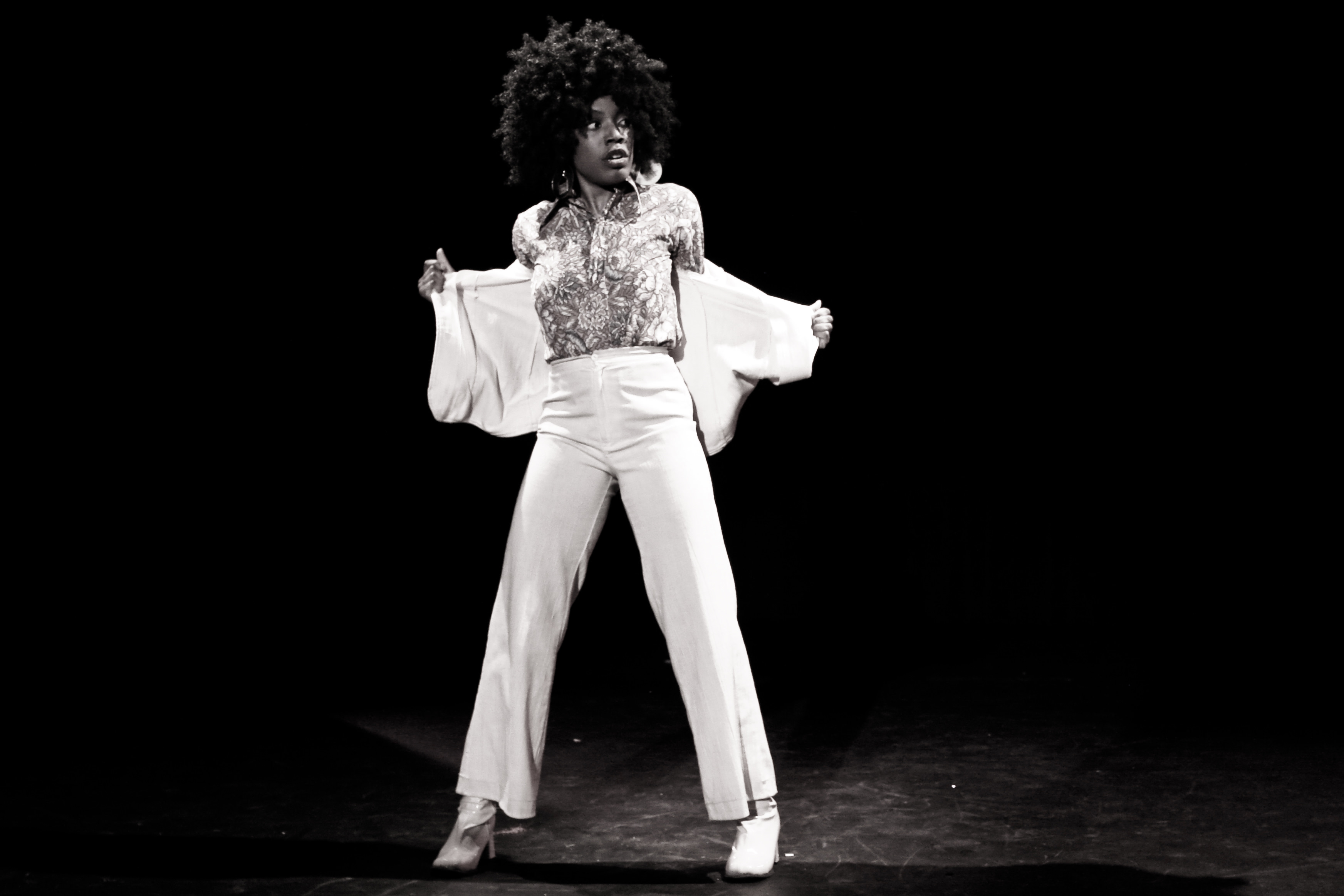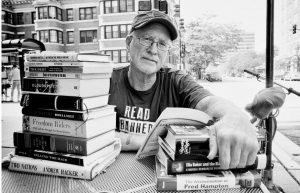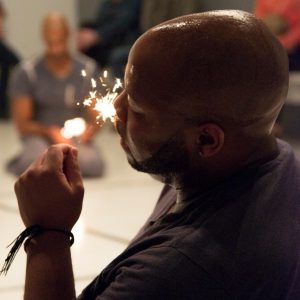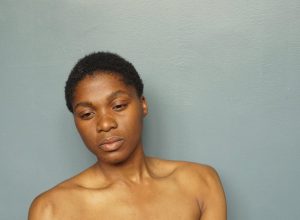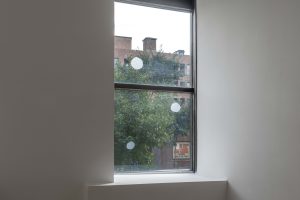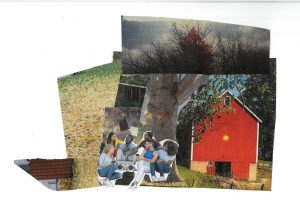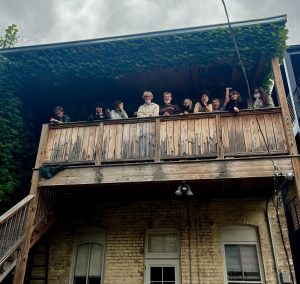Movement Matters investigates work at the intersection of dance, performance, politics, policy and issues related to the body as the locus of these and related socio-cultural dialogues on race, gender, ability and more. For this installment, we sit down with burlesque dancer and performance artist Po’Chop, whose real name is Jenn Freeman, to discuss coming out to her conservative church family, facing down toxic masculinity in the nightclub scene and performing the black body in profoundly frightening current and historical contexts of violent white supremacy.
Michael Workman: Your practice comes out of the burlesque scene, and has migrated from there into other disciplines. How did that all come about?
Jean Freeman (aka Po’Chop): Before, I had been predominately in the burlesque scene. After putting myself in certain spaces where I didn’t feel safe…in burlesque cabaret shows, audiences aren’t coming to face of any of the things I’m trying to deal with, they’re not interested in having that conversation. They want to be entertained. They want simple, surface entertainment. They’re not interested in examining sexuality, let alone black sexuality. Let alone asking questions about what some of the stereotypical views are in a nightlife setting, know what I mean? They’re there with their date and they want to see a pretty straight-forward show.

MW: Right, they don’t want to look under the surface and challenge their own assumptions.
JF: Right. I think I’ve been fortunate enough that, for the most part, my work has still been accepted in those spaces among a lineup of people. If you have one, I’m most likely the only black person in the show and my work is very confrontational. I’m not letting them get away with this, we’re going to process this, for the most part.
MW: So, when was that moment for you that you saw this shift taking place in your work?
JF: I don’t know if my work has changed so much as gigging—gigging has slowed down for me. I know I don’t need to be out in the nightclub scene doing my Black Panther piece. When I first started, it was kind of fun because those are the spaces, those are the audiences that need my work the most. I came to Chicago to go to Columbia College, studied dance and fiction writing and I didn’t finish. I came to the city from a very small town in Missouri. Then, moving to Chicago and going to a big liberal arts school was like a Lifetime movie. Imagine, that was my life. For a long time, I felt like the bottom had just been pulled out from beneath me. I also came out as gay, so there was that whole thing with my family when I was 18. Pretty much the summer of my freshman year. I came out to my parents and my dad was a minister. I grew up in the church. My thing when I came to Chicago was to study dance to become a missionary. I, honestly, don’t think I knew what liberal arts meant. Had I known, I don’t think I would have gone to Columbia. I would have gone to a more conservative school. But I’m not complaining. I’m very grateful that I did go to Columbia. But so, when I did come out, my mother pulled me out of school—
MW: Oh wow. They flipped out.
JF: Oh yeah. And also, my first relationship was with an R.A., so my mom kind of saw it as the school’s employee had manipulated me and it turned into a whole thing. So, I dropped out entirely. I tried to come back on my own, but it was like—
MW: How do you do that?
JF: Yeah. Everything that I had known was completely gone. So I just spent 3-4 years drifting around Chicago, just plowing through it. But then I found burlesque, I had a couple of friends who had started a troupe and they had to have been one of the first groups who were a part of that trend here.
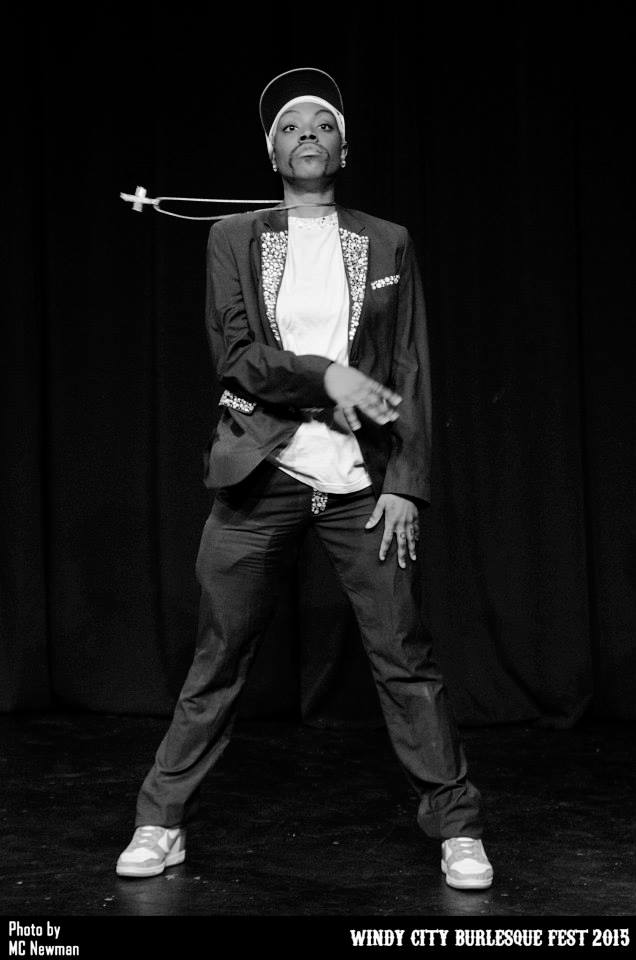
MW: Right, there was a resurgence of burlesque, going back into the ’90’s.
JF: I think I was drawn to it because it was all women and because of the fact that the person who’s presenting it is in charge of all aspects of it.
MW: Was this Jeezy’s?
JF: At the time it wasn’t Jeezy’s Juke Joint. The Ripettes is what it was, and they had started after doing a fundraiser for a theater company. This was seven or eight years ago.
MW: From there to RDDI.
JF: Yeah. RDDI (Regional Dance Development Initiative) was this huge gift. It changed my life. I’m still trying to unpack and process that. I’m trying to figure out how I can give that gift back to the burlesque community. I’m still definitely thinking of burlesque as a form of storytelling. One of my acts is called For the Record and I come out in my own interpretation of a demure, high feminine figure and slowly transition into more aggressive, irreverent, very foul manner in which the final reveal is a bull dyke figure.
This was all inspired by a trip that my partner and I had taken to New York to go and see a comedy show. I don’t go see comedy shows but I guess in New York a very common thing to do is just come out and heckle the audience, to come out and do joke after joke like they do about whoever’s in the audience. And every single comedian, they’d come out and scan the audience and do jokes about every single person in the audience except me and my partner. So I thought about this and maybe 1 may have said something about my partner, you know, she looks like a lesbian, she’s very butch. But just to think about that, what it means, that invisibility, for some reason they couldn’t even see us, we’re two women sitting at a table, very obviously touching each other and they couldn’t even acknowledge the fact, in my brain at least, that we were lesbians. We’re all humans in this room. If you feel it’s appropriate to make fun of that dude over there, then why can’t you make fun of the two obvious lesbians sitting in front of you? So that inspired that particular act. I think something I clearly struggle with is that, I’m someone who identifies as a lesbian and identifies as queer but I don’t look like that so sometimes I want to push back against the expectation. There’s this assumption too that just because I am femme that I’m automatically a bottom. I hate those terms, but sometimes I find them useful.
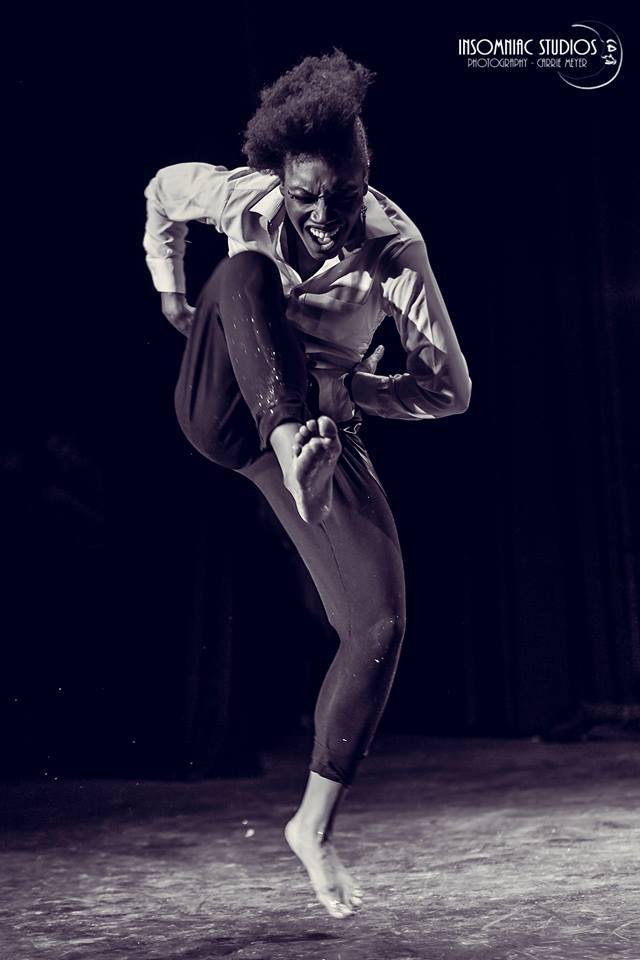
MW: Yeah. That you can’t switch or can’t be fluid. And performing that act then in a typical nightclub environment.
JF: Yeah, and I think that act is probably the most feminine I am on stage. Soft and demure. For me, I stay far away from demure, light foo-foo personas. My stage personas are usually very, very aggressive. I think when I first came into flirtation with performing, it was an alter-ego, kind of like a superhero. I allowed myself the space to be—I mean, I’m very shy. I consider myself an introvert. I didn’t speak up for myself, so when I created Po’Chop, I wanted that space. I don’t think it was intentional. Before I started performing as Po’Chop, I had 3 different names before I settled on it.
MW: What were the other personas?
JF: Oh God, they were awful. The first was Champagne Mystique—I had this friend who was in a sketch comedy group who hates burlesque so it was intentionally cheesy. And then the second one was Jenine Se Qua.
MW: Wow.
JF: Yeah, wow. Right? So once I settled on Po’Chop, I knew that was right. And I’ve done hundreds of performances under that name now.
MW: Your work is distinctly political and, though you mentioned it bothers you how people can water it down. How do you feel now about the political context of the work you’re performing?
JF: It definitely informs what I’m doing. My preparation, the flow of the act. Even before #blacklivesmatter picked up, I was looking at how a lot of Black Panther members were murdered and arrested—
MW: Especially in Chicago.
JF: Yeah, especially in Chicago. So, in the act, I had always been getting arrested. So now I go through many different phases of getting arrested. And, I’m not sure how many people pick this up, but how the different deaths look like on stage, from broken spines to I can’t breathe to incorporating some of the other iconic movements that other people would associate directly to that movement.
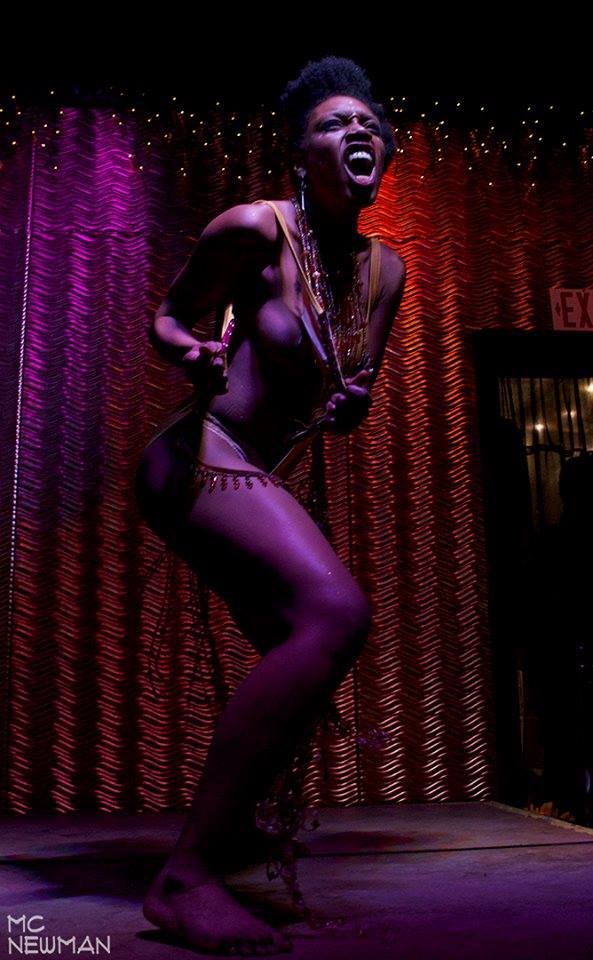
MW: Do you think there’s a more consciousness of the erasure and white supremacy than when you began performing?
JF: For sure. And I think Jeezy’s Juke Joint has helped that immensely, especially within the burlesque community. For sure. I think Jeezy has been one of the spearheads of doing that in terms of visibility and bringing people up with her as she climbs the burlesque ladder. She’s been really good. I know for a fact that she’s referred me to several other things, which has definitely helped. I also think that’s another reason I’ve been trying to be proactive about the spaces I do perform in because it is charged. And, it’s also—I’m not just revealing my body, I’m also revealing something that’s way down deep inside of me so it’s really easy for me to get my feelings hurt.
MW: That and then the violence around black bodies and the uncertainty about the audience.
JF: I already don’t feel safe living in this world, but then going into another space where I’m going to feel a whole other level of unsafety has been—yeah.
MW: That, and then there’s the whole gendered aspect.
JF: It depends. If you’re going to a burlesque show, the audience is going to be predominantly female. But if you’re going into a nightclub setting—I’m thinking very specifically about Untitled—it’s going to be a very male-driven environment. An I think there’s more money in that building in general, so there’s going to be more privilege when it comes to women’s bodies.
MW: What?!
JF: I go into Untitled knowing I’m going to get touched by a stranger, at least 3, every time I perform. So now I don’t really do that place either.
MW: But if you’re coming up, that’s what you’re going to expect.
JF: I tell my students to say no. And the burlesque community just formed a board with reporting on sexual harassment about certain spaces. So there is that. I also tell my students, if something happens to say something but don’t go there again. If you’re going into a space, use your intuition. We’re not getting paid enough, you’re lucky if they’re offering you $50. It’s gotten a little better, but there’s a ways to go.
Please feel free to send questions, comments or tips to Michael Workman at michael.workman1@gmail.com. As part of the Movement Matters series, a monthly online conversation on subjects discussed in the column will take place starting with The Integral Necessity of Dance Criticism on Dec. 15, 6:30-9:30pm at High Concept Laboratories (2233 S. Throop St., Chicago). Please join the Movement Matters Facebook page for updates, and to join in on future online conversations.
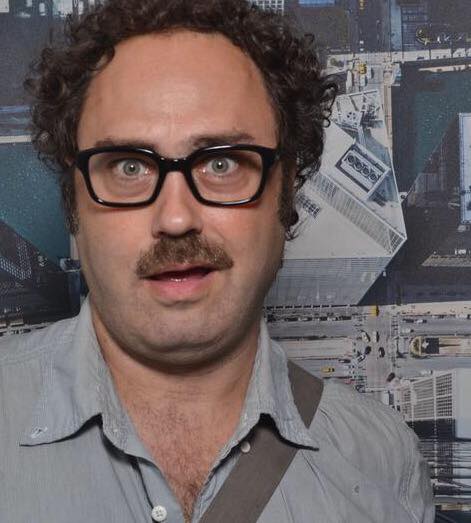 Michael Workman is an artist, writer, dance, performance art and sociocultural critic, theorist, dramaturge, choreographer, reporter, poet, novelist and curator of numerous art, literary and theatrical productions over the years. In addition to his work at The Guardian US, Newcity, Sixty and elsewhere, Workman has also served as a reporter for WBEZ Chicago Public Radio, and as Chicago correspondent for Italian art magazine Flash Art. He is also Director of Bridge, a Chicago-based 501 c (3) publishing and programming organization. You can follow his daily antics on Facebook.
Michael Workman is an artist, writer, dance, performance art and sociocultural critic, theorist, dramaturge, choreographer, reporter, poet, novelist and curator of numerous art, literary and theatrical productions over the years. In addition to his work at The Guardian US, Newcity, Sixty and elsewhere, Workman has also served as a reporter for WBEZ Chicago Public Radio, and as Chicago correspondent for Italian art magazine Flash Art. He is also Director of Bridge, a Chicago-based 501 c (3) publishing and programming organization. You can follow his daily antics on Facebook.
